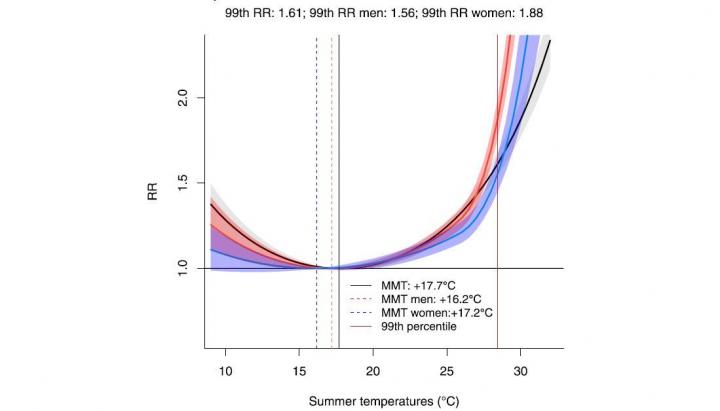
Credit: Ellena et al. Environmental Health (2020) 19:116
https://doi.org/10.1186/s12940-020-00667-x
Climate change has and will continue to induce severe increases in summer temperatures throughout Europe, especially in the Mediterranean region, where Italy stands out in terms of heat-related effects on daily mortality. In particular, the “urban heat island” effect makes it essential to understand context specific heat-health risks in cities in order to manage them with appropriate policy measures.
The association between heat and mortality depends on social vulnerability, which is in turn influenced by demographic, social and economic factors. Some sub-groups of the population are therefore more at risk as temperatures rise. Which are these groups?
A recent study coordinated by the Instituto de Salud Global de Barcelona (ISGlobal) and the CMCC Foundation investigates how social inequalities can affect heat stress in South European urban contexts through the case study of the city of Turin, Italy. The outcomes of the study are presented in the paper “Social inequalities in heat-attributable mortality in the city of Turin, northwest of Italy: a time series analysis from 1982 to 2018”, published in the scientific journal Environmental Health. Using an innovative methodology, the research associates daily temperatures and daily mortality in summer in the city of Turin for the period 1982-2018. Results show how the effect of heat on mortality varies widely between different population groups, divided by socio-demographic characteristics.
The mortality risk is higher for women than for men, and increases with age in both sexes. This study, however, considers not only the demographic aspects (age and gender) already explored in the literature, but also the level of education, the marital status and the number of household occupants: such socioeconomic variables are considered important for identifying the most vulnerable targets to heat stress. The women most at risk are those with the lowest educational levels, whereas the strongest effects on men are observed at the extremes (highest and lowest levels of education). Individuals living alone (such as the unmarried, separated, divorced and widowed), regardless of gender, were found to be at greater risk than married people. Finally, the association between heat and mortality was higher for men who live alone than for those who share a home with other people. For women, this difference is almost nil.
There are many studies on the link between heat and health, but few of them analyse the Italian context, especially using specific case studies. “We have chosen to focus on the city of Turin due to the availability of a very long historical series of daily data on mortality and hospitalization records crossed with the socio-economic components of the population. Talking about climate change it is necessary to consider sufficiently long periods of time. This data, made available by the Regional Public Health Observatory (SEPI) of the Local Health Board TO3, covers a 37 year period: there are few datasets available in Europe so long and rich in variables,” says Marta Ellena, CMCC researcher and lead author of the study.
This study paves the way for a series of further investigations that will support urban decision making to improve heat-health risk management. The next step will be to determine how this risk varies over time and how it is diversified on a sub-urban scale. “The need to determine the distribution of heat risk at a sub-urban level is increasingly clear: this comprehension can help to mitigate such risk by designing cities in the best possible way through all the strategies available, from the use of green areas to the choice of the building materials” explains Paola Mercogliano, director of the Regional Models and geo-Hydrological Impacts division at the CMCC Foundation. “Furthermore, the usefulness of this research extends to other contexts. Each sub-urban area refers to hospital centers: if heat waves are combined with ongoing epidemics, the number of people that need access to these centers could increase. As the current pandemic is showing us, it is good to be prepared”.
The REMHI division of the CMCC Foundation is developing climate models at very high resolution (2 km). In the future, thanks to these models, it will also be possible to evaluate the evolution of heat stress on the urban population for different cities, thus identifying priority actions in terms of adaptation in order to prevent health risks.
###
More information
Ellena, M., Ballester, J., Mercogliano, P. et al. Social inequalities in heat-attributable mortality in the city of Turin, northwest of Italy: a time series analysis from 1982 to 2018. Environ Health 19, 116 (2020). https:/
Media Contact
Mauro Buonocore
[email protected]
Original Source
https:/
Related Journal Article
http://dx.
https://scienmag.com/urban-heat-and-mortality-who-are-the-most-vulnerable/




